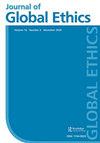Connecting relational wellbeing and participatory action research: reflections on ‘unlikely’ transformations among women caring for disabled children in South Africa
Q2 Arts and Humanities
引用次数: 0
Abstract
ABSTRACT Participatory action research (PAR) is a form of community-driven qualitative research which aims to collaboratively take action to improve participants’ lives. This is generally achieved through cognitive, reflexive learning cycles, whereby people ultimately enhance their wellbeing. This approach builds on two assumptions: (1) participants are able to reflect on and prioritize difficulties they face; (2) collective impetus and action are progressively achieved, ultimately leading to increased wellbeing. This article complicates these assumptions by analyzing a two-year PAR project with mothers of disabled children from a South African urban settlement. Participant observation notes, interviews, and a group discussion served as primary data. We found that mothers’ severe psychological stress and the strong intersectionality of their daily challenges hampered participation. Consequently, mothers considered the project ‘inactionable’. Yet, many women quickly started expressing important individual and collective wellbeing transformations. To understand these ‘unlikely’ transformations, a feminist relational account, in particular, that of relational wellbeing, proves essential. We reflect on the consequences of these findings for the dominant PAR methodology and operationalization, and propose to sensitize future PAR with marginalized women by employing relational wellbeing as an overarching ontological awareness.将关系幸福感与参与性行动研究联系起来:对南非照顾残疾儿童的妇女“不太可能”转变的思考
摘要参与性行动研究(标准杆数)是一种社区驱动的定性研究形式,旨在共同采取行动改善参与者的生活。这通常是通过认知的、反射性的学习周期来实现的,通过这些周期,人们最终会提高自己的幸福感。这种方法建立在两个假设之上:(1)参与者能够反思他们所面临的困难并确定其优先级;(2) 集体动力和行动逐步实现,最终导致福祉的增加。这篇文章通过分析一个为期两年的标准杆数项目,使这些假设变得复杂,该项目涉及来自南非城市定居点的残疾儿童的母亲。参与者观察笔记、访谈和小组讨论作为主要数据。我们发现,母亲们严重的心理压力和日常挑战的强烈交叉性阻碍了她们的参与。因此,母亲们认为该项目“不可行”。然而,许多女性很快就开始表达个人和集体幸福感的重要转变。为了理解这些“不太可能”的转变,女权主义的关系描述,特别是关系幸福的描述,被证明是必不可少的。我们反思了这些发现对标准杆数主流方法和操作的影响,并建议通过将关系幸福感作为一种总体本体论意识,来提高未来标准杆数对边缘化女性的敏感性。
本文章由计算机程序翻译,如有差异,请以英文原文为准。
求助全文
约1分钟内获得全文
求助全文

 求助内容:
求助内容: 应助结果提醒方式:
应助结果提醒方式:


